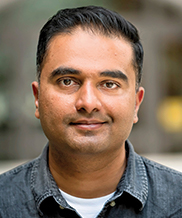Building Reciprocity: Curiosity and Learning in Humans and Machines
mediaX 2021 Virtual Conference
July 13, 14 and 15, 2021
Learning is rooted in what it means to be human. Exploration, curiosity, and feedback both fuel and guide development in humans, as well as in science and analytics. This is a lifelong endeavor for humans. Machines and systems, increasingly required to continue a trajectory of learning, rely on patterns, sequences, consistencies, feedback, and new instruction for their improvement. What similarities in curiosity and learning of humans and machines can be assumed or explored?
Over three days, mediaX thought leaders will share recent insights on important questions:
*In what ways can technological augmentation, simulation, or communication enhance the reciprocity between human and machine learning?
*Toward what reciprocal outcomes will we aspire for human and machine learning?
*How will the assessment of 21st century human learning be like or unlike the assessment of learning in automated systems?
Full Schedule: (All Times Pacific)
EMPOWERMENT – Tuesday, July 13, 8:00am-10:30am
“The Influence of Culture, Community and Context on Learning”
Industry Panel: “Designing Systems for Digital Instruction”
“Inclusive Innovation for Developing Relevant Learning Assessments”
DISCOVERY – Wednesday, July 14, 1:00pm-3:30pm
“A Taxonomy for Curiosity in Humans and AI”
“Limitations for Curiosity and Discovery in Open AI – GPT-3”
mediaX & NOVIM Awards
FEEDBACK – Thursday, July 15, 5:00pm-7:30pm
“Leaky Abstractions for Designing AI Experiences”
Industry Panel: “Teaching AIs to Provide Feedback to Humans”
Presenters

Hari Subramonyam is a Ph.D. candidate in the School of Information at the University of Michigan. His research focuses on ways to operationalize the vision of human-centered AI. By combining technical HCI work with qualitative studies of AI software development in practice, Hari brings multiple perspectives to bear on the cross-disciplinary problem of HAI. His work has received multiple Best Paper awards at top HCI conferences.

Stephanie Guamàn has been untangling the complexities of technology since 2005. She has experience doing design research with people of all walks of life, from patients to executives to engineers, among others. Stephanie collaborates closely with her team to craft a superior customer experience that humanizes technology. Stephanie is currently a Lead user researcher on the Facebook AI team focused on relevance. Before joining Facebook, Stephanie was a Lead Design Researcher at Cisco Systems, focused on humanizing Cisco’s award-winning enterprise and mid-market collaboration services. When she's not doing research, you can find Stephanie writing her next short story, being a tourist in her own city, or planning her next outdoor adventure.

Hirotsugu Kashimura is the President of Amada AI Innovation Laboratory Inc. Hiro previously served as the Director of the research center, Director of the US research subsidiary, and the representative of the Singapore research branch at a leading global office equipment company. Hiro has consistently engaged in research and new business development throughout his career. His areas of expertise include electronic devices, brain function modeling, human-AI (artificial intelligence) interactions, and UX. Hiro joined Amada Holding (then) in 2019 and was in-charge of designing and establishing Amada AI Innovation Laboratory. Appointed as the Director of the laboratory in January 2020, Hiro has been in charge of strengthening the existing businesses with AI-related technologies at the core, and developing new businesses from the perspective of Monozukuri (manufacturing). Hiro is pursuing a new concept of Monozukuri, through open innovation and partnerships in academia, industry, and R&D institutions, to respond to global shifts in technological and social trends.

Ramya Malur Srinivasan is an AI researcher in Fujitsu Research of America, wherein she is a member of the AI Ethics Research Center. Ramya’s background is in the areas of computer vision, machine learning, explainable AI, and AI ethics; with some of her research spanning diverse applications such as healthcare and finance.